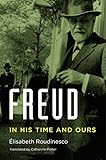Freud : In His Time and Ours / Élisabeth Roudinesco.
Material type: TextPublisher: Cambridge, MA : Harvard University Press, [2017]Copyright date: ©2016Edition: Translated by Catherine PorterDescription: 1 online resource (530 p.) : 1 chartContent type:
TextPublisher: Cambridge, MA : Harvard University Press, [2017]Copyright date: ©2016Edition: Translated by Catherine PorterDescription: 1 online resource (530 p.) : 1 chartContent type: - 9780674974524
- 150.19/52092 23
- BF109.F74 R6813 2016eb
- online - DeGruyter
| Item type | Current library | Call number | URL | Status | Notes | Barcode | |
|---|---|---|---|---|---|---|---|
 eBook
eBook
|
Biblioteca "Angelicum" Pont. Univ. S.Tommaso d'Aquino Nuvola online | online - DeGruyter (Browse shelf(Opens below)) | Online access | Not for loan (Accesso limitato) | Accesso per gli utenti autorizzati / Access for authorized users | (dgr)9780674974524 |
Browsing Biblioteca "Angelicum" Pont. Univ. S.Tommaso d'Aquino shelves, Shelving location: Nuvola online Close shelf browser (Hides shelf browser)

|

|

|

|

|

|

|
||
| online - DeGruyter The Rhinoceros and the Megatherium / | online - DeGruyter Insanity and Sanctity in Byzantium : The Ambiguity of Religious Experience / | online - DeGruyter Flaubert / | online - DeGruyter Freud : In His Time and Ours / | online - DeGruyter The Untold Story of the Talking Book / | online - DeGruyter Becoming Who I Am : Young Men on Being Gay / | online - DeGruyter Collective Choice and Social Welfare : An Expanded Edition / |
Frontmatter -- Contents -- Translator’s Note -- Introduction -- Part One. The Life -- Part Two. The Conquest -- Part Three. At Home -- Part Four. The Final Years -- Notes -- Works Cited -- Bibliography: Freud in French -- Freud’s Patients -- Family Tree -- Acknowledgments -- Index
restricted access online access with authorization star
http://purl.org/coar/access_right/c_16ec
Élisabeth Roudinesco offers a bold and modern reinterpretation of the iconic founder of psychoanalysis. Based on new archival sources, this is Freud’s biography for the twenty-first century—a critical appraisal, at once sympathetic and impartial, of a genius greatly admired and yet greatly misunderstood in his own time and in ours. Roudinesco traces Freud’s life from his upbringing as the eldest of eight siblings in a prosperous Jewish-Austrian household to his final days in London, a refugee of the Nazis’ annexation of his homeland. She recreates the milieu of fin de siècle Vienna in the waning days of the Habsburg Empire—an era of extraordinary artistic innovation, given luster by such luminaries as Gustav Klimt, Stefan Zweig, and Gustav Mahler. In the midst of it all, at the modest residence of Berggasse 19, Freud pursued his clinical investigation of nervous disorders, blazing a path into the unplumbed recesses of human consciousness and desire. Yet this revolutionary who was overthrowing cherished notions of human rationality and sexuality was, in his politics and personal habits, in many ways conservative, Roudinesco shows. In his chauvinistic attitudes toward women, and in his stubborn refusal to acknowledge the growing threat of Hitler until it was nearly too late, even the analytically-minded Freud had his blind spots. Alert to his intellectual complexity—the numerous tensions in his character and thought that remained unresolved—Roudinesco ultimately views Freud less as a scientific thinker than as the master interpreter of civilization and culture.
Mode of access: Internet via World Wide Web.
In English.
Description based on online resource; title from PDF title page (publisher's Web site, viewed 24. Aug 2021)


